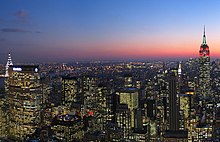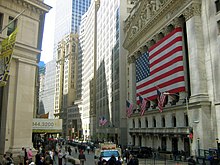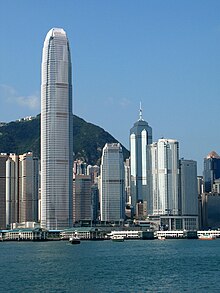Financial centre



A financial centre is a global city that is home to a large number of internationally significant banks, businesses, and stock exchanges. An international financial centre, sometimes abbreviated to IFC, is a non-specific term usually used to describe an important participant in international financial market trading, usually having at least one major stock market.
Global Financial Centres Index
The Global Financial Centres Index is compiled by the London-based British think-tank Z/Yen and is sponsored annually by the Qatar Financial Centre Authority.[3] As of October 2014, the top ten centres worldwide according to the Global Financial Centres Index in the world are:[4]
| Rank | Change | Centre
|
Rating |
| 1 | 778 | ||
| 2 | 777 | ||
| 3 | 756 | ||
| 4 | 746 | ||
| 5 | 719 | ||
| 6 | 718 | ||
| 7 | 717 | ||
| 8 | 715 | ||
| 9 | 705 | ||
| 10 | 704 |
International Financial Centres Development Index
The International Financial Centres Development Index is compiled by the Xinhua News Agency of China with the Chicago Mercantile Exchange and Dow Jones & Company of the United States, and is known as the Xinhua-Dow Jones International Financial Centers Development Index. According to the 2013 Xinhua-Dow Jones International Financial Centres Development Index, the top ten financial centres in the world are:[5][6]
| Rank | Centre
|
Rating |
| 1 | 89.10 | |
| 2 | 88.70 | |
| 3 | 84.43 | |
| 4 | 81.86 | |
| 5 | 75.81 | |
| 6 | 69.12 | |
| 7 | 66.23 | |
| 8 | 60.24 | |
| 9 | 58.88 | |
| 10 | 58.15 |
Comparisons





- New York City. During much of the second half of the 20th century, the United States and its financial capital, New York City, were the leaders. But over the past few decades, with the rise of a multipolar world with new regional powers and global capitalism, numerous financial centres have challenged the predominance of Wall Street, particularly from London and also Asia, which some analysts believe will be the focus of new worldwide growth. However, New York barely holds the top spot; the lead is “shaky, statistically insignificant” with a resurgent London constantly on its heels. [8] [9] One analyst suggested three prime factors for success as a financial city:
- a pool of money to lend or invest
- a decent legal framework
- high-quality human resources[10]
- In 2014, NYSE Euronext, the operator of the New York Stock Exchange and NYSE LIFFE, won a contract to administer the London interbank offered rate. [11][12] The new administrator is NYSE Euronext Rates Administration Limited,[13] a London-based, UK-registered subsidiary of NYSE Euronext, regulated by the UK’s Financial Conduct Authority.[14]
- London. London continues to maintain a very high financial profile. However, the City of London like New York has confronted new opponents since fast rising eastern financial centres (namely Hong Kong, Tokyo) arise taking in the facts that differing tax rules and regulatory environments and so forth into account.[15] There is a perception that "regulatory scrutiny is more burdensome in the United States than in London",[16] which has a "transparent and reliable legal system."[17]
- Hong Kong. In 2010, the Hong Kong Stock Exchange raised nearly $53 billion for initial public offerings (IPO), compared with only $42 billion for the U.S. and $16 billion (£10 billion) in London.[16][18] Hong Kong was the site of the world's largest IPO in 2006 of the $19.1 billion Industrial and Commercial Bank of China.[19] Hedge funds are doing well in Hong Kong with increased growth from 2006 to 2010.[18] One estimate in 2009 was that the Hong Kong stock market was the world's seventh largest and noted that 70 percent of the world's 100 largest banks were based in the city.[20]
- Tokyo. One report suggests that Japanese authorities are working on plans to transform Tokyo but have met with mixed success, noting that "initial drafts suggest that Japan’s economic specialists are having trouble figuring out the secret of the Western financial centers’ success."[21] Efforts include more English-speaking restaurants and services and the emergence of many brand new office buildings in Tokyo, but that have so far neglected more powerful stimuli such as lower taxes and a relative aversion to finance.[21]
- Luxembourg. The Luxembourg financial centre is the largest investment fund centre in Europe - and second in the world after the United States - the leading private banking centre in the Eurozone and the largest captive reinsurance centre in Europe. 152 banks from 27 different countries are established in Luxembourg.[22] The country is also the third largest renminbi centre in the world by numbers, in certain activities such as deposits, loans, bond listing and investment funds.[23] Three of the largest Chinese banks have their European hub in Luxembourg (ICBC, Bank of China, China Construction Bank).
- Frankfurt. The city is primarily seen as a competitor to London, given the location of both cities within the European Union.[24] It is the seat of Deutsche Börse, one of the leading stock exchanges and derivatives markets operators in the world, and the European Central Bank, which sets the monetary policy for the single European currency, the euro; in addition, in 2014 the European Central Bank will take over responsibility for banking supervision in the eurozone, further increasing the importance of Frankfurt as the banking centre for the 18 countries which form the eurozone. It is also the seat of Deutsche Bundesbank, the German central bank responsible for the monetary policy of the Deutsche Mark before the introduction of the euro.
- Seoul. South Korea's capital has been the world's fastest rising financial center since the late-2000s recession - In March 2009, Seoul ranked 53rd among global financial centers; by March 2012, Seoul skyrocketed to number 9.[25] Seoul has continued to build on the success with the completion of the International Financial Center Seoul in 2013. It ranked 7th in the 2015 Global Financial Centres Index, recording the highest growth in rating among the top ten cities.
- Chicago. The Illinois city has the "world’s largest derivatives market" when the Chicago Mercantile Exchange and the Chicago Board of Trade merged in 2007, under the CME Group.[16]
- Shanghai. Official efforts have been directed to making Pudong a financial leader by 2010.[26] Efforts during the 1990s were mixed, but in the early 21st century, Shanghai gained ground. Factors such as a "protective banking sector" and a "highly restricted capital market" have held the city back, according to one analysis in 2009 in China Daily.[27] Shanghai has done well in terms of market capitalisation but it needs to "attract an army of money managers, lawyers, accountants, actuaries, brokers and other professionals, Chinese and foreign," to enable it to compete with New York and London.[28] China is generating tremendous new capital, which makes it easier to stage initial public offerings of state-owned companies in places like Shanghai.[19]
- Sydney. Australia's most populous city is a major financial and business services hub not only for Australia but for the Asia-Pacific region. The Sydney State Savings Bank building is located on Martin Place in the central business district, home to the Sydney Stock Exchange and an array of business headquarters.
- Toronto. The city is a leading market for Canada's largest financial institutions and large insurance companies. It has also become one of the fastest growing financial centres following the late-2000s recession and the stability of the Canadian banking system. Most of the financial industry is concentrated along Bay Street, where the Toronto Stock Exchange is also located.
- Singapore. This city was mentioned as a competitor given its proximity to Asian markets, but not due to the fact that it was a major market itself. [17]
- Others. Cities such as São Paulo and Johannesburg and other "would-be hubs" lack liquidity and the "skills base," according to one source.[10] Financial industries in countries and regions such as the Indian subcontinent and Malaysia require not only well-trained people but the "whole institutional infrastructure of laws, regulations, contracts, trust and disclosure" which takes time to happen.[10] *
New York Times analyst Daniel Gross wrote:
In today’s burgeoning and increasingly integrated global financial markets — a vast, neural spaghetti of wires, Web sites and trading platforms — the N.Y.S.E. is clearly no longer the epicenter. Nor is New York. The largest mutual-fund complexes are in Valley Forge, Pa., Los Angeles and Boston, while trading and money management are spreading globally. Since the end of the cold war, vast pools of capital have been forming overseas, in the Swiss bank accounts of Russian oligarchs, in the Shanghai vaults of Chinese manufacturing magnates and in the coffers of funds controlled by governments in Singapore, Russia, Dubai, Qatar and Saudi Arabia that may amount to some $2.5 trillion. -- Daniel Gross in 2007[19]
An example is the alternative trading platform known as BATS, based in Kansas City, which came "out of nowhere to gain a 9 percent share in the market for trading United States stocks."[19] The firm has computers in the U.S. state of New Jersey, two salespersons in New York City, but the remaining 33 employees work in a center in Kansas.[19]
Offshore financial centres
An offshore financial centre, although not precisely defined, is usually a small, low-tax jurisdiction specialising in providing the corporate and commercial services to non-residents in the form of offshore companies and the investment of offshore funds.
The term offshore financial centre is a relatively modern neologism, first coined in the 1980s.[29] Although the terms are not synonymous, many leading offshore finance centres are regarded as "tax havens", and the lack of precise definitions often leads to confusion between the concepts. In Tolley's International Initiatives Affecting Financial Havens[30] the author in the glossary of terms defines an "offshore financial centre" in forthright terms as "a politically correct term for what used to be called a tax haven." However, he then qualifies this by adding "The use of this term makes the important point that a jurisdiction may provide specific facilities for offshore financial centres without being in any general sense a tax haven."
In 2009 the International Financial Centres Forum (IFC Forum) was established by a group of professional service firms and businesses with offices in the leading offshore centres.[31] According to its website, the IFC Forum aims to provide authoritative and balanced information about the role of the small international financial centres in the global economy.
See also
References
- ^ Nicole Pohl, Franklin & Marshall College. "Where is Wall Street? Financial Geography after 09/11" (PDF). The Industrial Geographer. Retrieved March 26, 2014.
- ^ Noelle Knox and Martha T. Moor (2001-10-24). "'Wall Street' migrates to Midtown". USA TODAY. Retrieved March 26, 2014.
- ^ "AFP: Hong Kong joins NY, London uk as top finance centre". Agence France-Presse.
- ^ "The Global Financial Centres Index 16" (PDF). Long Finance. September 2014.
- ^ "Xinhua-Dow Jones International Financial Centers Development Index - 2013" (PDF). Xinhua and Dow Jones. Retrieved September 22, 2013.
- ^ Zhou Bajun (September 18, 2013). "Future of HK finance relies on mainland". China Daily. Retrieved September 22, 2013.
- ^ "2013 WFE Market Highlights" (PDF). World Federation of Exchanges. Retrieved July 20, 2014.
- ^ http://www.thisismoney.co.uk/money/news/article-2581626/London-loses-crown-worlds-financial-centre-New-York.html
- ^ Nisha Gopalan (November 29, 2010). "Stock Brokers Flock to Asia in Search of Growth". Wall Street Journal. Retrieved 2011-01-15.
{{cite news}}: Italic or bold markup not allowed in:|publisher=(help) - ^ a b c Daniel Altman (September 30, 2008). "Other financial centers could rise amid crisis". The New York Times: Business. Retrieved 2011-01-15.
{{cite news}}: Italic or bold markup not allowed in:|publisher=(help) - ^ Nathaniel Popper (2013-07-09). "NYSE EuroNext to Take Over Administration of Libor". The New York Times:Dealbook. Retrieved 2013-07-20.
- ^ "NYSE EURONEXT SUBSIDIARY TO BECOME NEW ADMINISTRATOR OF LIBOR". NYSE Euronext. 2013-07-09. Retrieved 2013-07-21.
- ^ "BBA to hand over administration of LIBOR to NYSE Euronext Rate Administration Limited". The British Bankers’ Association. 2013-07-09. Retrieved 2013-07-20.
- ^ Anthony Browne, chief executive of the British Bankers’ Association (2013-07-11). "Libor now has a new administrator – but our reforms have gone much further". City A.M. Retrieved 2013-07-20.
- ^ Patrick McGeehan (February 22, 2009). "After Reversal of Fortunes, City Takes a New Look at Wall Street". The New York Times. Retrieved 2011-01-15.
{{cite news}}: Italic or bold markup not allowed in:|publisher=(help) - ^ a b c Heather Timmons (October 27, 2006). "New York Isn't the World's Undisputed Financial Capital". The New York Times. Retrieved 2011-01-15.
{{cite news}}: Italic or bold markup not allowed in:|publisher=(help) - ^ a b Beth Gardiner (January 20, 2010). "The London Banking Center Is Beginning to Feel Like Itself Again". The New York Times: Global Business. Retrieved 2011-01-15.
{{cite news}}: Italic or bold markup not allowed in:|publisher=(help) - ^ a b Cathy Holcombe (January 14, 2011). "Hong Kong and the Goldilocks Regulator". Wall Street Journal. Retrieved 2011-01-15.
{{cite news}}: Italic or bold markup not allowed in:|publisher=(help) - ^ a b c d e Daniel Gross (October 14, 2007). "The Capital of Capital No More?". The New York Times: Magazine. Retrieved 2011-01-15.
{{cite news}}: Italic or bold markup not allowed in:|publisher=(help) - ^ (Xinhua) (2009-06-02). "HK, Shenzhen promote financial industry in NY". China Daily. Retrieved 2011-01-15.
{{cite news}}: Italic or bold markup not allowed in:|publisher=(help) - ^ a b Martin Fackler (November 16, 2007). "Tokyo Seeking a Top Niche in Global Finance". The New York Times: World Business. Retrieved 2011-01-15.
{{cite news}}: Italic or bold markup not allowed in:|publisher=(help) - ^ http://www.cssf.lu/en/statistics/banks/monthly-stats/number
- ^ http://www.investmenteurope.net/investment-europe/news/2348962/luxembourg-third-largest-rmb-centre-worldwide
- ^ http://www.lboro.ac.uk/gawc/rb/pracbr5.html
- ^ http://www.koreasociety.org/corporate/seouls_rise_as_a_global_financial_center.html
- ^ Seth Faison (December 13, 1996). "Hong Kong Continues to Eclipse An Economic Rebirth in Shanghai". The New York Times: Business Day. Retrieved 2011-01-15.
{{cite news}}: Italic or bold markup not allowed in:|publisher=(help) - ^ Hong Liang (2009-05-04). "Software for a financial center here". China Daily. Retrieved 2011-01-15.
{{cite news}}: Italic or bold markup not allowed in:|publisher=(help) - ^ Dealbook (March 2, 2010). "Shanghai Opens Doors to Financial World". The New York Times. Retrieved 2011-01-15.
{{cite news}}: Italic or bold markup not allowed in:|publisher=(help) - ^ Offshore Financial Centres, Richard Roberts, ISBN 1-85898-155-7
- ^ ISBN 0-406-94264-1, Tim Bennett (2001)
- ^ "International Financial Centres Forum Launched", Cayman Financial Review, 5 January 2010, retrieved 16 March 2011
